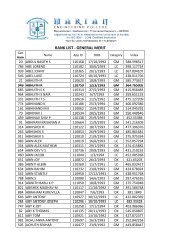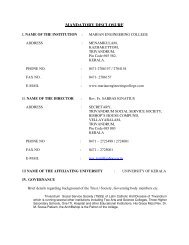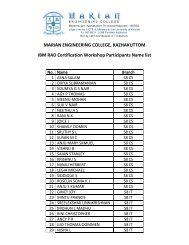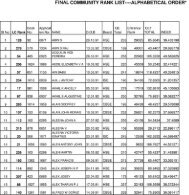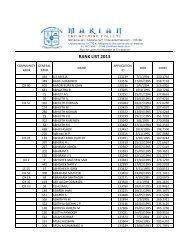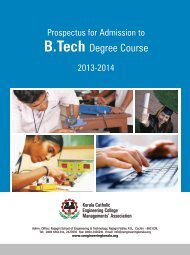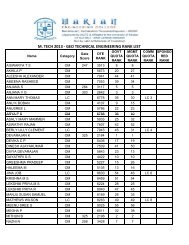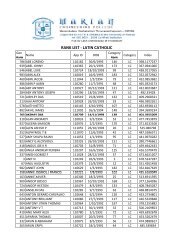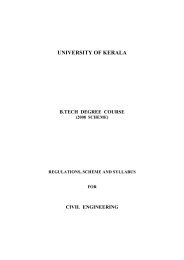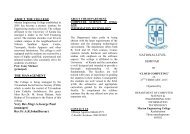UNIVERSITY OF KERALA - Marian Engineering College
UNIVERSITY OF KERALA - Marian Engineering College
UNIVERSITY OF KERALA - Marian Engineering College
Create successful ePaper yourself
Turn your PDF publications into a flip-book with our unique Google optimized e-Paper software.
B.Tech Comp. Sc. & Engg., University of Kerala 27<br />
08.302 PROBLEM SOLVING AND PROGRAMMING IN C (R F) 2 – 2 – 0<br />
Module I (15 hours)<br />
Introduction to digital computer – VonNewman concept – hypothetical decimal computer – functional units<br />
of a computer – storage – primary storage – secondary storage. Introduction to programming languages –<br />
types of programming languages – high level languages – assembly language – machine language. Problem<br />
solving concepts – flow charts and algorithms – problem definition phase – general problem solving strategies<br />
– top-down design – breaking a problem into sub problems – choice of a suitable data structure.<br />
Documentation of programs – debugging of programs.<br />
Module II (20 hours)<br />
Important C concepts. Preprocessor directives – header files – data types and qualifiers – operators and<br />
expressions – enumerations – data input and output – control statements – arrays and strings – structures and<br />
unions – working with bits in C – storage classes. Example programs including bubble sort, selection sort, and<br />
linear and binary search.<br />
Module III (17 hours)<br />
Pointers – arrays of pointers – structures and pointers. Memory allocation functions. Function – function<br />
definition – function prototypes – function call by value and call by reference – recursive functions. Data files<br />
– formatted, unformatted and text files. Low level programming in C. Command line arguments. Example<br />
programs.<br />
Text Books:<br />
1. Computer Programming in C – V. Rajaraman, PHI<br />
2. Programming with C – B.S. Gottfried, Schaum’s Series, TMH.<br />
3. A structured Programming Approach Using C – B.A. Forouzan and R.F. Gilberg, Thomson Learning.<br />
4. Problem Solving and Program Design in C – J.R. Hanly and E.B. Koffman, Pearson/Addison Wesley<br />
5. Fundamentals of computers – V. Rajaraman, PHI<br />
Reference Books:<br />
1. The C Programming language – Keringhan B.W. and Ritche D.M., PHI 1990.<br />
2. Programming with ANSI and Turbo C – Ashok N. Kamthane, Pearson Education India<br />
3. Programming Techniques through C – M.G. Venkateshmurthy, Pearson Education India.<br />
4. A Book on C – A. Kelly and I. Pohl, Pearson Education.<br />
Internal Continuous Assessment (Maximum Marks-50)<br />
25 Marks - Tests (minimum 2)<br />
15 Marks - Assignments (minimum 3) such as home work, problem solving, literature survey, seminar,<br />
term-project, programming exercises in C, etc.<br />
10 Marks - Regularity in the class<br />
University Examination Pattern<br />
PART A: Short answer questions 10 x 4 marks=40 marks<br />
All questions are compulsory. There should be at least three questions<br />
from each module and not more than four questions from any module.<br />
PART B: Descriptive/Analytical/Problem solving questions 3 x 20 marks=60 marks<br />
Candidates have to answer one question out of two or two questions<br />
out of four from each module.<br />
Maximum Total Marks: 100



